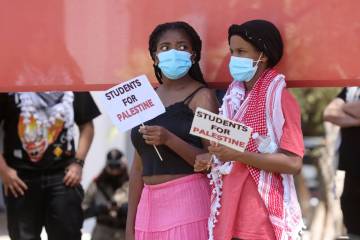Three area high school seniors face challenges without fail
Michael McGrath spent part of his senior year living in a homeless encampment.
Quilon Cochran balanced schoolwork with caring for her new baby.
And Mariamo Mukoma completed her courses while handling many of the responsibilities for her immigrant family.
For most of the thousands of local high school seniors, final exams were all that stood between them and graduation. But some of their classmates also faced challenges of a more grown-up variety.
The Review-Journal spoke to three very different Las Vegas seniors who overcame extreme or unusual obstacles to finish school this year. These are their stories:
MARIAMO MUKOMA
What Mariamo Mukoma remembers most about her early childhood in a refugee camp in Kenya is all the sickness. It was everywhere.
"There were so many people sick in one area, coughing," the 18-year-old says.
She can't help but reflect on that dark past when considering a much brighter future one afternoon in the cozy three-bedroom apartment near the University of Nevada, Las Vegas she shares with her parents and six siblings.
The walls and floors are draped with colorful fabrics and mats following Somali tradition. While modest and small for nine people, the apartment is worlds away from the refugee camp.
Mariamo, wearing a long, floral-print dress, hair pulled neatly away from her face, credits that past for leading her to where she is today, about to graduate from Southwest Career and Technical Academy, a magnet high school. She has only to pass a final proficiency exam, in math, which she plans to take in July.
"I'm going to pass it," she says with a smile.
The self-described average student will be the first person in her family to graduate from high school; indeed, she was the first to attend high school at all. Her parents didn't have many opportunities growing up poor in war-torn Somalia. They can't read or write.
Mariamo's mother, Fatuma Luhizo, was married at 12 years old; her father, Salim Mofi, was 21.
"When you get your period, you get married," Mariamo says.
Together, Fatuma and Salim decided to flee Somalia, hoping for a better life for themselves and their future children. They left for Kenya on foot, hitching a ride here and there.
Mariamo, the eldest child, was born in a refugee camp when her mother was 14. A sister, Hawa, came two years later.
Hawa wasn't as lucky as her sister. She contracted malaria at age 3. The disease devastated her tiny body and brain, leaving her permanently disabled and unable to care for herself. The girls' parents adopted a new goal: Go to America, where Hawa could perhaps have a decent, dignified life.
In 2004, immigration officials approved the family's move to Las Vegas. Mariamo was 10 years old. Staffers from Catholic Charities of Southern Nevada's migration and refugee services helped the family settle. But Mariamo wound up handling many of the responsibilities that came with the family's new life - responsibilities still hers today.
"I couldn't speak English, but I could write," she says. "I had to take over. I learned English in a year."
In addition to helping care for her sister, Mariamo serves as translator and advocate for her parents. She helps them pay bills, make appointments with doctors and fill out immigration papers and leases.
Her father eventually found work as a stove cleaner in a Strip hotel. Her mother stays home to care for Hawa and the other children, the youngest of whom is 2 years old.
Mariamo, her parents and three of her siblings are lawful U.S. permanent residents. Her three youngest siblings were born here and are citizens.
The family still struggles, but is grateful for what they have.
"Some people aren't satisfied" with their lives in the United States, Mariamo says. "You should be satisfied. Over there, nobody would care. Nobody would help."
Mariamo, who also works in a clothing store at a local mall, plans to attend the College of Southern Nevada part-time in the fall. Her parents can't help much with tuition, and she doesn't want to take on a lot of debt. She will stay in town for now to help her parents, she says.
"I can't leave them."
Mariamo's past also inspired her career goals: She wants to become a nurse. She has volunteered hundreds of hours at University Medical Center, helping patients get around.
"I want to do something with my life," she says. "My dream is to one day open a house for girls in Africa, where they can come and get food and everything they need."
She looks forward to college and building a future linked to her past. "I can't wait to see where I am in 10 years."
MICHAEL McGRATH
Five months ago, Michael McGrath did his homework by streetlight.
The Rancho High School senior kept his knife close by for protection in the homeless encampment where he lived with his parents, the three of them sharing a dusty two-man tent.
He never felt safe in the camp on Owens Avenue near Interstate 15, where every night something scary was going on: "Drug deals, you name it."
Today, Michael, who just turned 18, lives in the larger of two bedrooms in an apartment on Spencer Street just north of Tropicana Avenue. He has his own bathroom. His parents, Mark and Jennifer McGrath, share the smaller room.
"They told me I deserve it for what I've been through the past couple of years," Michael says while showing off his tidy new room.
The B and C student also plans to finish high school this year, after making up some credits in summer school, and would like to attend the College of Southern Nevada, with help from a couple of scholarships.
Not bad for a kid who spent about a year of high school homeless, and much of his life before that bouncing from one rent-by-the-week motel to the next. It's the first time he's had his own room.
"It's intense," he says. "I feel awkward when I'm in the apartment and my parents aren't here. It's a big place when I'm alone."
It's also been an intense journey for the family, who along with scores of others in January were ousted from a growing encampment at the edge of Las Vegas' homeless corridor. Citing sanitation issues, police told the campers they were trespassing and needed to move along.
Michael, who appeared to be the youngest person living in the camp, stood out in other ways as well. His curly hair was neatly trimmed, his clothes and shoes clean, his dark eyes direct. He looked like a typical teenager, not the resident of a homeless encampment.
The family, who became homeless after Air Force veteran Mark, 52, lost a construction job, didn't want to go to a shelter because they might have had to separate.
After the McGraths' plight was detailed in the Review-Journal, outreach workers moved the family into a one-bedroom apartment near the Strip. Michael slept on the couch.
Once the family proved they were committed to intensive case management through Straight from the Streets, a nonprofit that helps the homeless, they were rewarded with a year's lease on a larger apartment.
Jennifer, 42, and Mark proved they could stay sober, despite previous methamphetamine use. They regularly attend outpatient drug treatment classes and individual counseling sessions and are mending fences with extended family members who grew frustrated with their past drug use.
Michael, who previously tested positive for marijuana, also has remained drug-free and successfully completed his high school proficiency exams. He still must complete a couple of credits in summer school to get his diploma. He missed a lot of school over the course of his high school career.
The most challenging part was getting there. Michael either walked or took the bus, and didn't always have money for bus passes. He now spends an hour each way on the bus to Rancho.
Finishing high school has been a priority for Michael, in part because Jennifer made it so. She didn't graduate, but later earned a GED.
"I know how hard it is without a diploma," she says. "I know what an education can do."
Michael's curls have grown longer, and he runs his fingers through them as he speaks. His mother "helps me every day, helps me get up" for school.
While he hasn't yet decided what career to pursue, he feels like he's already beaten the odds.
He's excited about the prospect of attending college and doesn't worry about being able to handle the course work. Still, he's a little nervous: "There's going to be older girls there."
QUILON COCHRAN
Baby Myla bounces on her mother's lap; her twin pigtails look like tiny pompoms atop her head.
When she smiles, she's the spitting image of her mother: both baby-faced and apple-cheeked.
Myla is 1 year old. Her mother, Quilon Cochran, is 18.
Both went through a lot in their young lives before arriving here, to a comfortable one-bedroom apartment of their own on Maryland Parkway just south of Tropicana Avenue. They've been here just a few days. The two girls have moved around a lot, staying sometimes with Quilon's mom, other times in transitional housing for young mothers with children and no other place to go.
"It's been really rough," Quilon says. "I felt so alone."
But Quilon thinks things might be looking up. She and Myla have this new apartment, paid for by a local "homeless to home" program. And Quilon, who maintains a 3.5 grade point average and has passed all her high school proficiency exams, is slated to graduate - in a blue cap and gown - from Delta Academy on June 12.
The small charter school aims to educate "nontraditional" students who have dealt with homelessness, behavioral or substance abuse problems or simply do better outside a traditional high school setting.
Quilon's set to receive a "beating the odds" award from her school.
"Everybody thought I was going to drop out," she says. "I didn't come this far to drop out. I'm going to prove people wrong. "
Quilon got pregnant at 16, the result of being raped at a party, she says. The alleged perpetrator, an older man, left town and has not been arrested or charged, she says.
She doesn't believe in abortion and opted to keep the baby. The pregnancy "happened, so what are you going to do?" she says.
Quilon has had a stormy relationship with her mother, and has lived with her only sporadically in recent years. Her father lives in another state.
She spent the end of her pregnancy and Myla's first months at Living Grace Home, a transitional group home for pregnant, unwed girls and young women. The nonprofit opened in 2007 in a quiet residential neighborhood in Henderson and has housed dozens of girls who came from broken families, abusive relationships, addiction and even the streets. They stay until their babies are three months old.
There, Quilon learned how to change a diaper, using a teddy bear for practice. She remembers it as a wonderful, supportive time. "I ended up keeping up with all the girls."
She also feels lucky to have some things other teen mothers may not. Her grandmother runs a day care and watches Myla for free while Quilon's in school. And the baby has slept through the night almost since Day One.
"She wouldn't cry," Quilon says. "She just sat there."
Quilon returned to school four weeks after Myla was born.
She also has some supportive family members and friends, and recently began receiving financial help from the federal Temporary Assistance for Needy Families program.
After graduation, Quilon hopes to continue her education at a vocational school with the goal of eventually becoming a pharmacy or respiratory technician. She's learning about programs that help single mothers pay for such schooling.
"I've come this far and I want to keep going," she says. "I'm going to find something to get me on my feet. I'm going to have me a good ol' job, not stand in the welfare line."
Through it all, Quilon says she has learned a valuable lesson that she will pass along to her daughter.
"You can't depend on anyone else," she says. "You have to depend on yourself."
Contact Lynnette Curtis at Lynnette.Curtis@yahoo.com.
Cox airing graduations
Cox Communications will be airing, live, the graduations of 46 local high schools on Channel 96 from June 10-24. The ceremonies can also be watched live at cox96.net by clicking on the "Live TV" tab, but Cox will only be filming graduations at the Orleans Arena and Thomas & Mack Center. Graduations for Las Vegas and Foothill high schools, for example, won't be aired because they're happening at their respective campuses. Click here or see below for a full list of graduation broadcasts.
Las Vegas Review-Journal

























